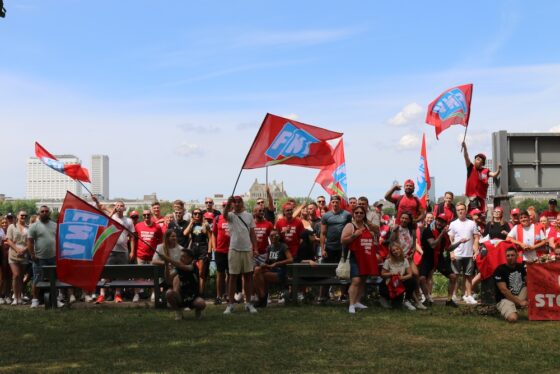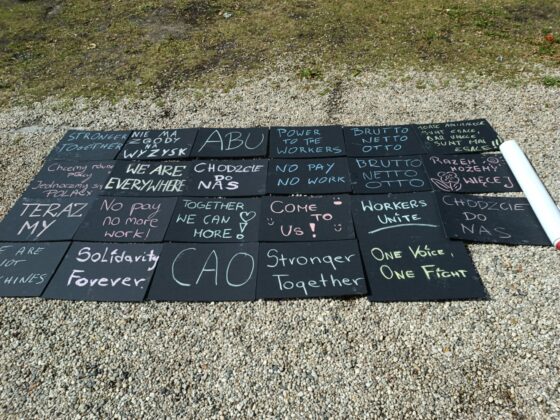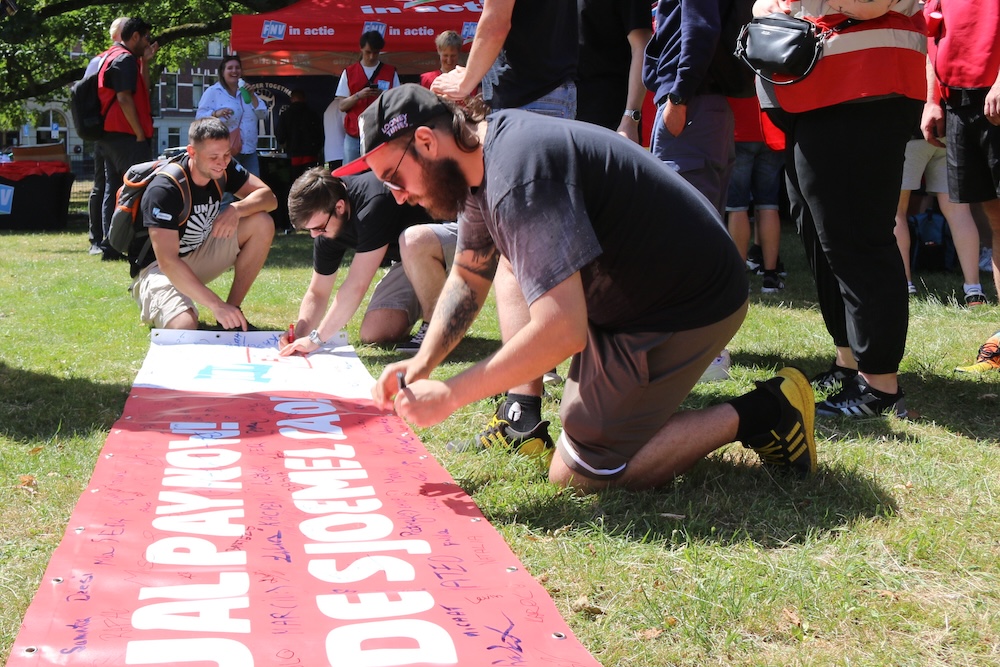For some 10 days now, workers who pick orders in Dutch supermarket distribution centres via staffing agencies have been going on strike in support of better pay and working conditions. Many of them are Polish nationals.
“If Poles stopped working in the Netherlands, we would have to close down the country,” Cihan Ugural from trade union federation FNV told the strikers in Rotterdam last week, where some 150 people had come to protest.
Friday’s gathering was part of the first-ever strike of agency workers in the Netherlands and the strikers are mainly Poles working in distribution centres in the southern part of the country.
The strike began in Pijnacker on June 25. Within a week, Zwolle and Geldermalsen joined in, followed by Tilburg on Wednesday, July 3. According to FNV representatives, between 200 and 300 people have participated so far. Most work for the Albert Heijn supermarket chain through the Otto Workforce agency, some are also employees of Tempo-Team.
“Agency workers are a marginalised group,” said Anja Dijkman, who negotiates labour agreements at FNV. “Their housing often depends on their employer. It’s very brave of them to go on strike.”
The direct reason for the strike is the new collective labour agreement – CAO – which is set to take effect on January 1, 2026. The agreement envisions “equivalent treatment” of agency workers and those employed directly by the distribution centre but, the union says, many of the measures will unfairly impact on agency workers.
“The new agreement includes a cut in sick pay and we are already not paid for the first day of sick leave,” said Paulina Nietupska, an FNV representative at the Tilburg distribution centre. “We also have fewer days off and don’t get annual bonuses unlike regular employees.”
Equivalent pay could, she points out, also mean that part of the salary is paid, for example, in vouchers to learn Dutch, regardless of whether the employee will use them.
Last Friday’s protest had a picnic-like atmosphere. FNV employees fried burgers, someone played pop hits from a Bluetooth speaker. There was a queue for the food tent, all under an FNV banner stating “Equal standards, equal treatment”. Participants sat on long wooden benches or sought shade under the trees.
FNV representatives addressed the crowd. MPs Mariette Patijn, from the GroenLinks-PvDA alliance, and Bart van Kent from the SP, also made an appearance. Speeches in English and Dutch were translated into Polish so everyone could understand.
Poles form the largest group of EU nationals in the Netherlands, making up about 1% of the country’s population. For them, the staffing agency pay deal is just one issue.
Productivity
Many mention the constantly rising productivity norms. This is especially problematic for order-pickers, whose job is to prepare products for distribution or shipment. Workers say they are being given less time to turn an order around but that at the same time, the number of products they have to deal with is rising.
“We get 20 minutes to flip 30 crates of beer,” said one 30-year-old woman. “It doesn’t matter that these things are too heavy for a woman to carry. Recently, the crates have also been put so high on the shelves that we have to lift them above our heads. This makes it impossible to work as efficiently as they want.”


Grzegorz Celiński, who is 23, works on a conveyor belt. “Between the two of us, we process 2,000 to 2,400 products an hour,” he says. “It’s hot and noisy with these machines and the products fly fast. Contract workers don’t want to do this work because it’s hard.”
Failing to meet the target means a difficult conversation with the manager. If the situation continues, the contract might not get renewed.
“Agencies constantly prey on our ignorance,” says Paulina Nietupska. “That’s why I decided to get involved. I don’t accept the way we are treated as second-class people when we do the most work in the warehouses. In the Netherlands, immigrants do the toughest jobs – not only from Poland, but also Croatia or Bulgaria.”


The FNV is hoping to persuade industry associations ABU and NBBU to resume negotiations on a new pay deal and on Tuesday, union representatives met officials from the VNO-NCW employers organisation to plead their case.
Some 250 protesters gathered in The Hague, first in front of the headquarters of the VNO-NCW and later then close to parliament, supporting the union and calling for action.
The union is also talking to employers who hire agency workers, such as Albert Heijn directly.
“If you look at distribution centres – the Albert Heijn or Jumbo supermarkets, but also the Dutch post office, for example – out of a thousand people, 900 are agency workers. This is a joke,” union negotiator Dijkman said. “Why can’t these people just be hired? It’s obvious that this way, the workers are cheaper. That’s the crux of the conflict – we want equal rights. This is about respecting people.”
Staffing agency umbrella groups ABU and NBBU were contacted for comment but did not respond.
